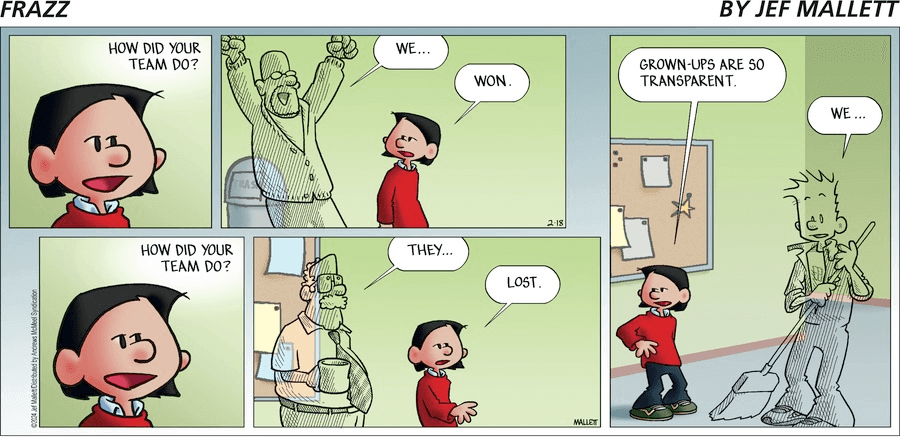
Frazz (AMS) starts us off with a head-scratcher. I think the observation is right, but it comes from a direction I hadn’t explored, so it set me back a bit.
There are those who object to fans using “we” at all, but that’s nonsense. Why bother having uniforms or selling gear if you don’t want the people in the stands to identify with the team? Which in turn leads to why sell tickets or broadcast rights which leads to why pay the players?
OTOH, some fans sure take it too far, either as individuals or as a group. Patriots fans seem to cheer their team (or at least they used to) as a group symbol, while NY Jets fans somehow appear to believe they really are part of the team.
But even well-balanced fans of well-balanced franchises tend to identify with the team in good times and to distance themselves in bad times.
The language pointed out here is amusing; but the psychology being described is less so, because it’s rarely confined to sports.
When you finally get back up on your feet again
Everybody wants to be your old long-lost friend
Said it’s mighty strange, without a doubt
Nobody knows you when you’re down and out

Here’s another cartoon that comes with its own semi-classical quote: Jen Sorensen comments on the Alabama Supreme Court decision, which pro-life extremists are quietly embracing while practical politicians run away from it.
The extremists are embracing it because it’s key to overturning the right to several kinds of contraception as well as any sort of grace period for terminating a pregnancy, but that’s not a good thing to admit, since so many voters are opposed to giving up their bodily autonomy.
So Republicans are proposing laws to allow IVF, on the hypocritical principle that it’s okay to terminate eight or ten blastomerical babies at a single blow, but you can’t do it one at a time.
I guess until the November campaign goes into full swing, we won’t know whether this contradiction is a bug or a feature of their position, but Sorensen does a nice job of showing the absurdity of it all, in case anyone cares about logic, morality and that sort of thing.
And it gives me a chance to add a quote to emphasize her point that these embryos are considered less as potential human beings than as political pawns within a wider concept of seeing all of us as cogs in an economic machine.
Her vision of programming is an extension of what Huxley posited in Brave New World:

I’d note that dystopian stories remain hot with the middle-school crowd, and if they can read “The Hunger Games” they’re ready for “Brave New World,” “Fahrenheit 451” and “Animal Farm.”
I’d also note that the kids who read “Hunger Games” and Harry Potter in middle school have now emerged from college and will be voting in November.
Keep the faith, baby.
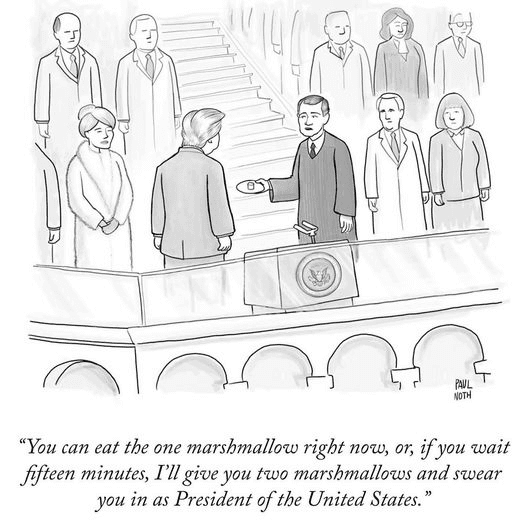
And don’t forget the power of a good laugh, as seen in this Paul Noth panel.
Yeah, yeah, I know: The marshmallow experiment has been questioned, but whether the experiment was economically biased is irrelevant if you apply it to someone with all the economic and educational resources anyone could possibly grow up with.
Anyway, we all know that, if John Roberts proposed such a challenge and then turned his back for 15 minutes, he’d find an empty plate when he looked again.
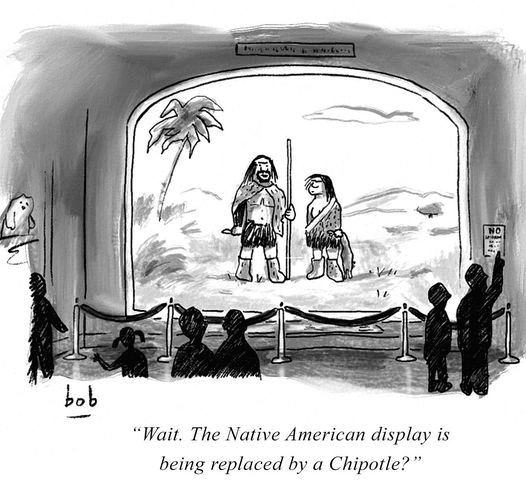
Bob Eckstein offers a bit of good news, in a roundabout way.
The American Museum of Natural History, and others around the country, have had to close down exhibits due to a new law requiring consultation with native peoples over what items must be returned to them and what can be exhibited respectfully and properly.
But not History Colorado, as this Pro Publica report details, because they began getting their act together several years ago and are in compliance. This makes me happy because I used to deal with them when I was mentoring young reporters in Denver and I already knew they were cool people.
It also pleases me because when I’ve written about native history, I’ve found that you can call tribal historians and get their perspective, and that getting the story right was a goal of theirs as well.
Over the years, I picked up the phone and did fact-checks with a variety of tribes and nations, which makes it hard for me to understand how anyone could mount an entire exhibit without talking to the people involved.
It’s as much an issue of respect as it is of competent research.
Juxtaposition of the Monotremes
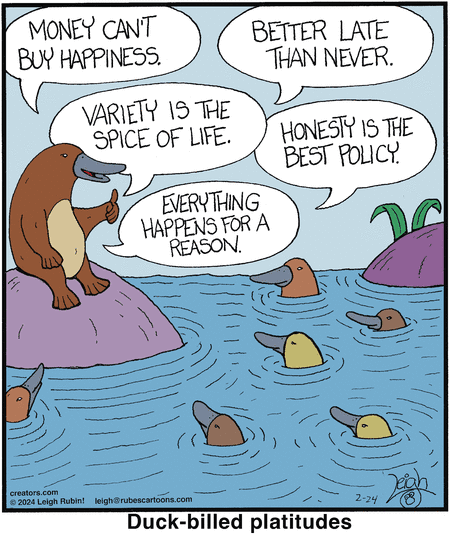
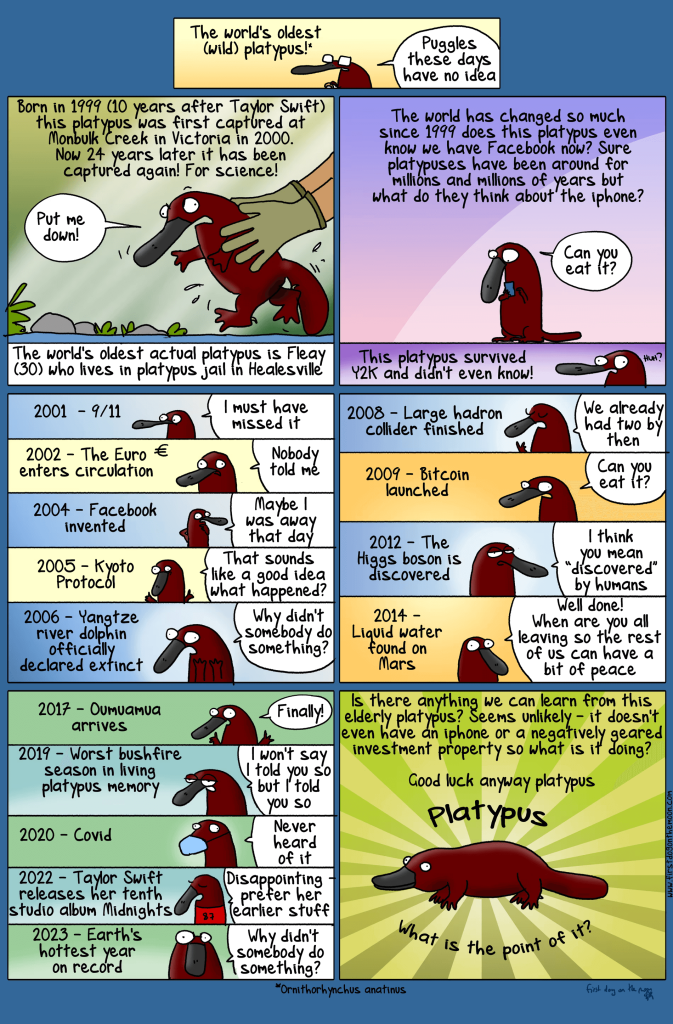
I don’t have a lot to say about platypi except you rarely see one and this past week we saw two, and three if you count a rerun. Wikipedia says it is “sometimes referred to as the duck-billed platypus,” which strikes me as silly, since it implies that there is also a platypus without a duck-bill and I do not believe that to be the case.
Which reminds me of Edwin Newman’s “Strictly Speaking,” a delightful old screed in which, among many other things, he railed against unnecessary middle initials, his point being that it’s absurd to say “US President John F. Kennedy” unless you are distinguishing him from John W. Kennedy, who was also president of the United States.
Which is not a digression because I wasn’t headed anywhere anyway.


Zits (KFS) brings up a favorite topic of mine this week. Not waterbeds specifically, but the process of setting parents in the right age bracket.
I encountered my first waterbed at a Whole Earth festival in Boulder in 1971, about a year before I became a father to someone who, today, is over 50, but I never slept on one until 1986, and if I’d had a kid a year after that, he’d still be a lot older than Jeremy.
Still, Walt admits to some lag in his hipness, and I had kids in my 20s. Jeremy’s folks seem older than I ever was, so maybe they were late adaptors in all sorts of ways.
Which is to say, maybe Walt had a waterbed, but I’ll bet he never had a Chevy van.
And that’s all right with me.
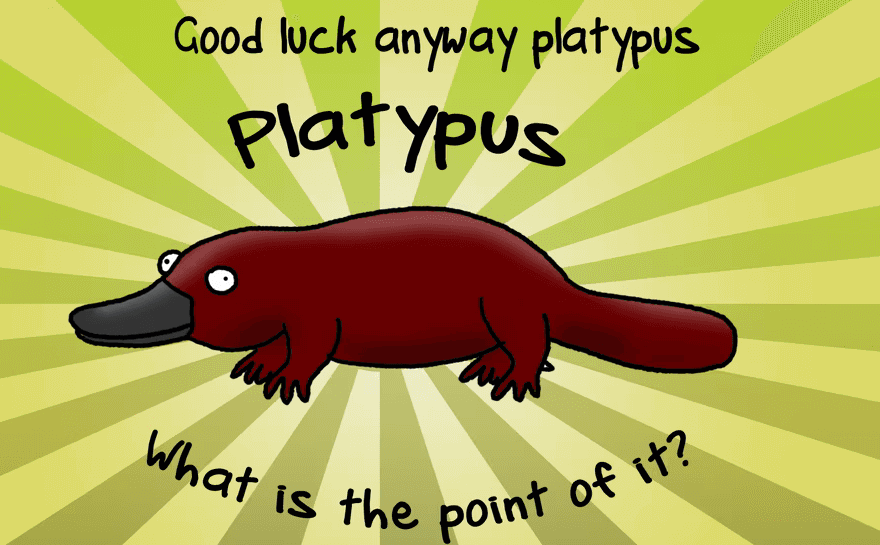
Platypodes. From the Antipodes.
Reds announcer Marty Brennaman told the story of how early in his career he told a player after a game, “We won!” to which the player replied. “We? I didn’t see YOU on the field.” Brennaman switched to “they” after that.
Speaking of frozen embryos and child labor laws, didn’t Iowa recently propose a bill that would allow minors to get married?
Frazz: I entirely missed the we/they, focusing on the body language.
Zits: I had a water bed for 6 years in grad school. We bought another in 1980 when we bought a house, and still sleep on one. (We have a thick pad so don’t need a heater.)
>hard for me to understand how anyone could mount an entire exhibit without talking to the people involved
Kinda like men voting on abortion laws, innit?
Scientifically there ARE several Platypuses that are not duck-billed.
The genus and species of the Duck-billed Platypus is Ornithorhynchus anatinus.
Because not long before the discovery and description(by Europeans) of the famed monotreme, a genus of weevil was named Platypus, because of their flat feet. All species of Platypus are boring be… umm… wood boring beetles.
Re indigenous history: When Queen Elizabeth visited her colony of Australia in 1963, one of the elaborate pageants presented to her and Phil was a glittering celebration of white settlement, depicting the arrival of Captain Cook. One of the “highlights” was a huge performance of Aboriginal dance on a football field in which not one of the many dancers was actually an indigenous person. Nowadays, every Australia Day holiday (Jan 26) sparks endless “settlement vs invasion” debates in the media and massive protest rallies in the streets. It’s become the most divisive date on the calendar.
And re the duck-bill business: I always chuckle when someone says “Here’s a photo of me when I was younger”. Is there any other kind?
Way back in college, I took an Intro to Sociology class, and during one lecture the professor talked about the subject that Frazz covered. In that case, it was in relation to the university’s basketball team, and the professor pointed out that while we students might say “We won” regarding last night’s game, there was only one student of the ~150 in the room that could actually say that, as they were on the team, and he was likely one of the few that would say “We lost” if the results had gone the other way, the rest of us saying “They lost”. Further details have been lost to fuzzy memory, other than it is a thing that has been studied and documented, and I don’t recall it being limited to grown-ups.
As noted, anytime they want to resolve this issue, they can start by no longer selling jackets, jerseys and caps featuring the team’s logo.